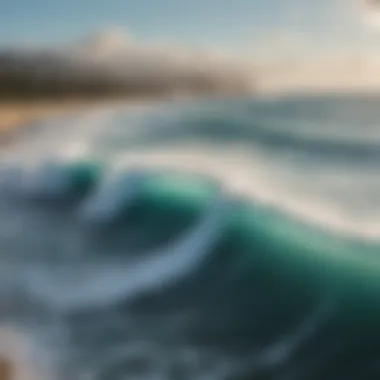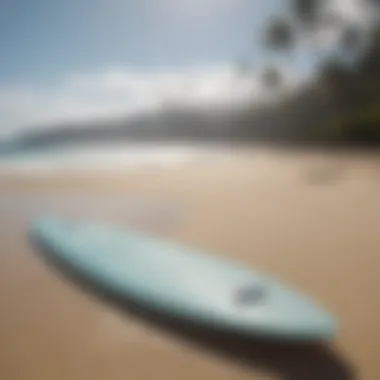Unraveling the Hawaii Swell Forecast for Thrill-Seeking Sport Enthusiasts


Equipment and Gear
Discovering the optimal equipment and gear is crucial for extreme sports enthusiasts preparing to tackle the Hawaii swell forecast. While helmets, ropes, and harnesses are staples for safety, the intricate details of top brands and recommended products create a significant impact on performance. Exploring the nuances of maintenance, upgrades, and advancements in equipment ensures athletes are well-equipped for the challenging conditions that come with extreme sports in Hawaii.
Techniques and Training
Delving into advanced skills and techniques is essential for mastering extreme sports amidst Hawaii's dynamic wave conditions. Detailed breakdowns of training exercises and routines designed to enhance strength, agility, and endurance provide athletes with a competitive edge. Insights from professional athletes and trainers offer invaluable guidance on honing these skills to navigate the exhilarating yet demanding waves of Hawaii effectively.
Safety and Risk Management
Safety protocols and risk management are paramount when embarking on extreme sports adventures in Hawaii. Understanding the common risks and potential hazards inherent in such activities is crucial for athletes to mitigate dangers effectively. Equipping oneself with strategies for risk mitigation and emergency preparedness ensures that enthusiasts can enjoy their adrenaline-pumping pursuits with confidence and preparedness.
Events and Competitions
For adrenaline seekers seeking to immerse themselves in the thrill of extreme sports, staying abreast of upcoming events, competitions, and championships is key. Profiling top competitors and teams within the extreme sports community offers valuable insights into the competitive landscape. Coverage of recent events coupled with highlights from key competitions provides enthusiasts with a comprehensive view of the pulse of the extreme sports scene in Hawaii.
Lifestyle and Community
Beyond the thrill of extreme sports lies a vibrant lifestyle and community that shapes the very fabric of this adrenaline-fueled world. Aspiring athletes can benefit from features on various lifestyle aspects related to extreme sports culture, gaining insights into how to balance their passion with a healthy lifestyle and optimal mental well-being. Valuable tips and strategies on maintaining this delicate balance enrich the experience for extreme sports enthusiasts seeking holistic fulfillment in their pursuits.
Introduction to Hawaii Swell Forecast
The advent of Hawaii Swell Forecast marks a pivotal juncture in the realm of extreme sports, as it caters to the insatiable thirst for adventure harbored by enthusiasts of adrenaline-fueled activities. This section delves deep into the intricacies of predicting swell patterns in the mesmerizing waters of Hawaii, a pursuit that serves as a guiding compass for surfers and water sports aficionados. By unraveling the nuances of Hawaii's unique swell dynamics, this segment aims to equip thrill-seekers with the foresight necessary to navigate the tumultuous yet exhilarating waves that grace the Hawaiian shores.
Understanding Swell
Definition of Swell in Surfing


The concept of 'swell' in the realm of surfing embodies a fundamental essence that drives the very essence of this water sport. Defined as the series of mechanical waves that propagate across the ocean surface, swell encapsulates the energy transfer from distant storms to the awaiting shores. Its significance lies in providing surfers with a predictive tool that outlines the impending wave conditions, guiding them towards optimal surfing experiences. The allure of swell lies in its ability to forecast wave characteristics, offering surfers a glimpse into the future surfing prospects, a feature indispensable for every individual seeking aquatic exhilaration.
Factors Influencing Swell Patterns
In the intricate tapestry of swell patterns, various factors exert their influence, orchestrating the symphony of waves that cascade onto the Hawaiian coasts. From wind speed and duration to the expansive travel distance undertaken by swells, these elements coalesce to shape the unique signature of each wave. Their impact reverberates throughout the surfing community, dictating the quality and size of the waves that crash ashore. While these factors are indispensable in heralding the imminent swell behavior, they also bear the responsibility of painting a vivid picture of the conditions awaiting the intrepid surfers ready to conquer the Hawaiian waves.
Mechanics of Swell Formation
Wind Influence on Swell Creation
In the genesis of swell formation, winds stand as the maestros orchestrating a breathtaking symphony of oceanic waves. The influence of winds transcends mere directionality, encompassing speed, consistency, and the spatial dimensions of their influence. As winds caress the ocean's surface, their energy infuses the aqueous expanse, germinating the seeds of swells that traverse vast distances to grace the Hawaiian shores. This intricate interplay between winds and water lays the foundation for the majestic waves that beckon surfers to partake in a thrilling rendezvous with nature's aquatic marvels.
Travel Distance and Swell Size
The travel distance undertaken by swells serves as a testament to their resilience and power, unraveling a tale of endurance and determination painted across the vast canvas of the Pacific Ocean. As swells journey across oceans, spanning great expanses in their quest to reach distant shores, they amass energy and momentum, culminating in the majestic proportions observed upon their arrival. The correlation between travel distance and swell size elucidates the interconnectedness of these variables, underscoring the meticulous craftsmanship of nature in crafting the waves that beckon surfers to indulge in unparalleled aquatic adventures.
Importance of Swell Direction
Impact of Swell Angles on Wave Quality
The trajectory adopted by swells as they traverse the ocean's embrace casts a profound impact on the quality of waves awaiting avid surfers along the Hawaiian seashores. The angle of approach adopted by swells dictates the manner in which waves unfold, influencing their shape, speed, and overall surfability. Surf enthusiasts keen on unraveling the enigma of wave dynamics pay heed to these swell angles, cognizant of their pivotal role in shaping the surfing experience. The interplay between swell angles and wave quality forms the crux of this discourse, shedding light on the subtle yet profound influence that directional nuances wield over the enthralling waves that beckon surfers to embark on daring exploits in the Hawaiian waters.
Analyzing Hawaii's Unique Swell Patterns
In delving into the intricacies of the Hawaii swell forecast for extreme sports enthusiasts, it is essential to comprehend the unique swell patterns that grace the Hawaiian shores. Understanding these patterns is paramount for anyone seeking to conquer the waves with finesse and skill. The swell patterns in Hawaii are not just random occurrences but rather a harmonious dance of natural forces that converge to create the perfect surfing conditions. By analyzing Hawaii's unique swell patterns, surfers can gain invaluable insights into when and where the best waves will form, allowing them to make the most of their surfing expeditions.
North Shore Swell Dynamics


Winter Versus Summer Swells
The distinction between winter and summer swells is a critical aspect of Hawaii's surfing landscape. Winter swells, typically generated by powerful storms in the North Pacific, bring in large, powerful waves that attract experienced surfers looking for an adrenaline rush. In contrast, summer swells, often originating from gentler winds and less intense weather systems, offer a more relaxed surfing experience suited for beginners and intermediate surfers. Understanding the characteristics of both winter and summer swells is key to optimizing one's surfing ventures in Hawaii.
Ideal Conditions for North Shore Breaks
The North Shore of Hawaii is renowned for its legendary breaks, attracting surfers from across the globe in pursuit of epic waves. The ideal conditions for North Shore breaks involve a combination of swell direction, wave height, and wind patterns that culminate in perfect surfing conditions. Surfers flock to these breaks not only for the breathtaking waves but also for the camaraderie and vibrancy of the surfing community. Navigating the nuances of North Shore breaks can lead to unforgettable surfing moments that stay etched in a surfer's memory forever.
East and South Shore Swell Variations
Effects of Trade Winds on East Shore Swells
The trade winds play a significant role in shaping the swell patterns on the East Shore of Hawaii. These winds, emanating from the northeast, interact with the ocean's surface, generating swells that cater to a diverse range of surfing preferences. Surfers can experience the thrill of riding waves influenced by these trade winds, adding an element of unpredictability and excitement to their surfing escapades. By understanding the effects of trade winds on East Shore swells, surfers can adapt their surfing techniques to make the most of these unique conditions.
Diversity of Surf Breaks on South Shore
The South Shore of Hawaii presents a myriad of surf breaks, each offering a distinct surfing experience. From long, peeling waves perfect for longboard enthusiasts to fast, hollow barrels that challenge even the most seasoned surfers, the diversity of surf breaks on the South Shore caters to every surfer's preferences. Surfers can explore a tapestry of waves along the South Shore, each break presenting its own set of challenges and rewards. Embracing the diversity of surf breaks on the South Shore opens up a world of surfing possibilities, inviting surfers to expand their skills and horizons in the vast playground of the Pacific Ocean.
Factors Influencing Hawaii Swell Forecast
When delving into the realm of Hawaii's swell forecast for extreme sports enthusiasts, understanding the factors that influence this forecast is paramount. The reliability of wave predictions hinges on an intricate interplay of various elements, each contributing to the allure and challenge of surfing in Hawaii. By dissecting the intricacies of these factors, surfers can gain a nuanced perspective on how nature shapes the waves they seek to conquer.
Local Weather Systems
Hawaiian Islands' Microclimates
Navigating Hawaii's diverse microclimates becomes a pivotal facet of deciphering the swell forecast. The distinct atmospheric conditions across the archipelago play a pivotal role in dictating wave behavior. With each island boasting its own climate nuances, surfers must attune themselves to the minute differences that can significantly impact surfing conditions. Unraveling the unique characteristics of Hawaiian microclimates lends a deeper understanding of surfing patterns, guiding enthusiasts towards optimal spots for their adrenaline-fueled escapades.


Correlation Between Storms and Swell
Exploring the intricate dance between storms and swell unveils a crucial aspect of Hawaii's surf forecast. Storm systems, both local and distant, hold the key to deciphering the upcoming wave spectra. By establishing correlations between storm dynamics and swell patterns, surfers can anticipate the surging pulse of the ocean with enhanced precision. Delving into this relationship sheds light on the predictive power of weather systems, empowering surf enthusiasts to make informed decisions for their next surfing expedition.
Oceanographic Conditions
Effects of Ocean Currents on Swell Behavior
Traversing the captivating realm of ocean currents illuminate a fundamental element of Hawaii's swell forecast. The ebb and flow of these currents orchestrate the mesmerizing rhythm of the waves, shaping surfing experiences across the Hawaiian waters. By unraveling the implications of ocean currents on swell behavior, adventurers can decipher the intricacies of wave dynamics, gaining a strategic edge in conquering the Hawaiian breaks. An in-depth exploration of these effects unveils the mesmerizing interplay between oceanic forces and surfing thrills.
Topographic Influences
Reef and Seabed Configurations Impact
Venturing into the realm of reef and seabed configurations introduces a pivotal dimension to Hawaii's swell forecast. Beneath the azure surface lie intricate formations that sculpt the waves into iconic swells or challenging barrels. Understanding how these geological features influence wave patterns is synonymous with unlocking the secrets of Hawaii's surf spots. By examining the impact of reef and seabed configurations, surfers can strategize their surfing escapades with precision, fostering a profound connection between rider and wave.
Utilizing Swell Forecasts for Surfing Expeditions
Utilizing Swell Forecasts for Surfing Expeditions serves as a crucial element in unveiling the Hawaii swell forecast in this detailed guide tailored for extreme sports enthusiasts. By delving into the realm of swell forecasts, individuals can gain valuable insights into wave conditions, enabling them to plan their surfing expeditions with precision and expertise. Understanding the intricacies of swell reports not only enhances the safety of surfing adventures but also heightens the overall experience by capitalizing on optimal wave patterns and directions. By focusing on Utilizing Swell Forecasts for Surfing Expeditions, this article aims to equip adrenaline junkies with the necessary tools to navigate the dynamic waters of Hawaii's coast.
Best Practices for Reading Swell Reports
Interpreting Wave Height and Period Data
Exploring the nuances of Interpreting Wave Height and Period Data is an essential component of dissecting swell reports effectively. Analyzing wave height provides surfers with critical information on the size of incoming waves, aiding in determining the level of challenge they may encounter. Moreover, understanding wave period data aids in comprehending the time interval between successive waves, influencing surfing strategy and positioning. The significance of Interpreting Wave Height and Period Data lies in its ability to empower surfers with data-driven decisions, allowing them to tailor their approach based on the current wave dynamics. By deciphering these key metrics, surfers can amplify their surfing experience, optimizing performance based on actionable insights gained from interpreting wave height and period data.
Assessing Wave Direction for Optimal Surfing
Assessing Wave Direction for Optimal Surfing plays a pivotal role in crafting a successful surfing expedition based on swell forecasts. By evaluating wave direction, surfers can discern the angles at which waves approach, strategically positioning themselves for the best ride. Understanding wave direction not only impacts wave quality but also dictates the speed and intensity of the surfing experience. The unique feature of Assessing Wave Direction for Optimal Surfing lies in its ability to align surfers with prime surfing conditions, maximizing the thrill and glide offered by each wave. While it presents advantages in terms of enhancing surfing performance, assessing wave direction also introduces challenges, such as adapting to varying wave angles and adjusting surfing techniques accordingly.
Navigating Surf Spots Based on Forecast
Choosing Breaks Suited to Swell Conditions
Navigating the selection of surf spots based on forecast relies heavily on Choosing Breaks Suited to Swell Conditions for a gratifying surfing experience. Selecting breaks that align with swell conditions can significantly boost the quality of each surf session, ensuring optimal wave heights and shapes for riders. The key characteristic of Choosing Breaks Suited to Swell Conditions is its impact on wave suitability, guaranteeing that surfers encounter waves that complement their skill level and surfing preferences. This feature proves beneficial to individuals seeking specific wave characteristics, enhancing their overall satisfaction with the chosen surfing location. While offering advantages in terms of tailored surfing experiences, this approach also presents challenges, such as the need to adapt to diverse swell patterns and wave behaviors according to each selected break.















